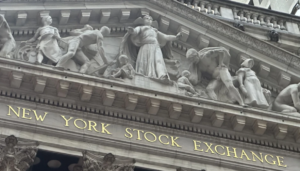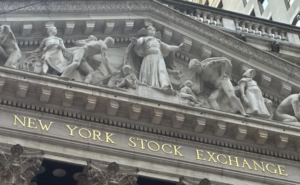Global stock markets showed mixed results on Monday as investors found opportunities despite concerns over U.S. President Donald Trump’s tariffs.
In Europe, France’s CAC 40 rose by 0.2%, reaching 7,988.29, while Germany’s DAX gained 0.3%, reaching 21,817.79. The UK’s FTSE 100 climbed 0.4% to 8,738.98. In the U.S., stock futures were pointing to a slight increase, with Dow futures up by 0.2% at 44,507.00, and S&P 500 futures rising 0.3% to 6,067.50.
In Asia, Japan’s Nikkei 225 ended almost unchanged, rising just under 0.1% to 38,801.17. Japan’s government reported a record current account surplus of 29 trillion yen ($191 billion) for the previous year, reflecting strong returns on overseas investments, helped by a weak yen and recovering Japanese exports.
This current account surplus, which is considered a broad indicator of trade performance, grew by nearly 30% from the prior year, reaching its highest level since record-keeping began in 1985.
In currency markets, the U.S. dollar strengthened against the Japanese yen, rising to 152.41 yen from 151.39 yen. Meanwhile, the euro decreased slightly, costing $1.0321, down from $1.0328.
Nippon Steel, which has faced opposition from both President Trump and former President Joe Biden regarding its attempt to acquire U.S. Steel, saw a decline of 0.5% in its shares. During a joint press conference with Japanese Prime Minister Shigeru Ishiba on Friday, Trump stated that Nippon Steel would instead invest in U.S. Steel, rather than pursuing the acquisition.
Japan’s government spokesman, Yoshimasa Hayashi, informed reporters in Tokyo on Monday that Nippon Steel was preparing “a bold proposal” to invest in U.S. Steel, which would be mutually beneficial for both countries. However, he did not provide further details. Nippon Steel chose not to comment on the matter.
In the stock markets, the Hang Seng index rose by 1.8% to 21,521.98, and the Shanghai Composite increased by 0.6% to 3,322.17, despite the ongoing tariffs imposed by Trump on Chinese imports.
Technology stocks were among the top performers, fueled by growing expectations of stimulus measures from China. In response, China has implemented tariffs on specific American goods and launched an antitrust investigation into Google.
Donald Trump announced on Monday that he would impose 25% tariffs on all steel and aluminum imports into the United States from every country.
Stephen Innes, managing partner at SPI Asset Management, warned that markets are likely to experience volatility, with Asian economies particularly impacted by the tariffs, including those affecting imports from Mexico and Canada.
Trump granted a 30-day delay for tariffs on goods from Mexico and Canada. However, the newly introduced 25% tariffs on steel and aluminum will apply to these countries as well.
Innes pointed out that Asian markets could face a turbulent opening, though some of the effects may already be priced in.
South Korea’s Kospi dropped by less than 0.1%, closing at 2,521.27, while Australia’s S&P/ASX 200 fell 0.3% to 8,482.80.
Investors are also closely monitoring upcoming earnings reports. Honda Motor Co. and Nissan Motor Corp. are set to report their earnings on Thursday, amid growing speculation that their discussions about forming a joint holding company may fall apart. Media reports in Japan, based on anonymous sources, have caused significant fluctuations in both companies’ stock prices. Honda’s stock declined by 0.9% on Monday, while Nissan’s fell 0.8%.
In the energy market, U.S. crude oil rose by 40 cents to $71.40 per barrel, while international benchmark Brent crude increased by 41 cents to $75.07 per barrel.














